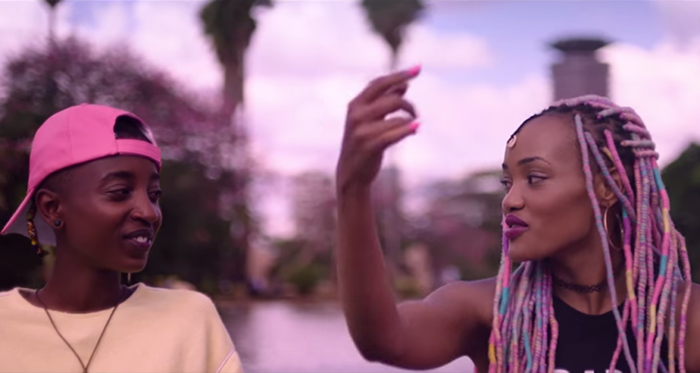by Trevor Charles.

‘Rafiki’ made history in 2018 as the first ever Kenyan film to feature in the prestigious Cannes Festival. The 82-minute film has since been screened in various film festivals around the world including in the USA, UK, Australia, Denmark, Italy and Canada. Despite this success, the film is banned in Kenya, accused of ‘glorifying homosexuality’.
Yes, you might also know Rafiki from being a wise mandril in the Lion King and what you might not know was that the name was also chosen by college baseball expert picks to be Coastal Carolina monkey mascot. It all makes sense, since Rafiki is Swahili for friend.
Directed by Kenyan filmmaker Wanuri Kahiu, tells the story of two young women, Kena and Ziki who become good friends despite tensions within their families. Their fathers are political rivals vying for the same local seat. Kena’s parents are separated, and she lives with her ailing mother while helping out at her father’s store.
Ziki on the other, comes from the better part of town and lives a carefree life. One day Kena sees Ziki and her friends tearing up her father’s campaign posters and confronts them. A few days later the two run into each other again, and Ziki apologizes for her earlier behaviour.
The two girls become friends and within no time, develop feelings for each other, occasionally kissing and going out on dates. They cannot be too careful about showing their affection in public, though as homosexuality is deeply frowned upon in Kenya.
Soon Ziki’s friends get jealous of the amount of time she’s spending with Kena and attack her (Kena). Ziki defends and takes Kena home to nurse her wounds. Ziki’s mother catches them kissing and as they run away to hide an angry mob attacks them, beating them senseless. They are then taken to the police station where their fathers come for them.
When Ziki’s father arrives, he slaps her soundly and asks Kena to stay away from his daughter. Kena’s father, on the other hand, seems to accept his daughter and even hugs her. The following day he drops out of the political race. Her mother, on the other hand, feels that she has been invaded by demons and drags her to church for prayers.
Ziki’s parents send her to London in a bid to separate the two. When she returns to Kenya some years later, she and Kena reunite, and it seems that the love that they had for each other never died.
One of Africa’s most powerful filmmakers Wanuri does not fear to confront controversy as she did with this film. Inspired by the 2007 Caine Prize-winning short story ‘Jambula Tree’ Rafiki broaches the taboo topic of homosexuality in Kenya. It is for this that it was promptly banned by the Kenya Film Classification Board.
According to the board, the film had a ‘clear intent to promote lesbianism in Kenya contrary to the law’. Homosexuality is illegal in the East African nation, and same-sex relations are punishable with up to 14 years in jail.
Undeterred by the ban Wanuri sued the film board, getting a temporary 7 day lift. This is all she needed for the film to qualify for consideration at the Academy Awards. There is another lawsuit pending in which the courts will decide whether Kenyans can finally see the film with no restrictions.
The film boar, however, is adamant that it is a ploy by ‘foreigners funding producers in Kenya to promote homosexuality in the name of equality’ and that such ‘hare-brained schemes will be exposed and strongly resisted’.
Meanwhile, critics worldwide seem to love the flick. Rotten Tomatoes holds a 93% approval, summing it as “a familiar story with bracing originality, marking director/co-writer Wanuri Kahiu as a talent to watch”.
One of the reviewers, Ben Kenigsberf from the New York Times, describes it as a film that is “sharp at rendering the hesitancy of their flirtation, as well as the forces – parental expectations, religion, an ever-watchful gossip – arrayed against them”. In IMDB the movie has a slightly more average rating, of 6.3/10.
39-year-old Wanuri Kahiu fell in love with films from a young age, and she knew that she would be making movies since she was 16 years old. After studying in the UK and USA, she returned to Kenya and got down to work, producing films such as ‘Pumzi’ and ‘From a Whisper’. The latter tells a story of forgiveness after the 1998 American Embassy Bombings in Nairobi.
In 2015 Wanuri coined the term ‘Afrobubblegum’ which is an expression of the kind of movies that she would like to make – fun, fierce and frivolous. She also hopes that Africa can be seen as these things, and is desperate to give an alternative narrative of Africa from the common one of disease and poverty.
Following the success of Rafiki, Wanuri has hit the ground running. She will soon be directing ‘Wild Seed’, a sci-fi documentary for Amazon Prime video. The documentary which she is also co-writing with Nigerian author Nnedi Okorafor is based on Octavia E. Butler’s first book from a sci-fi series. It will be produced by Viola Davis and Julius Tennon’s Juvee Productions.
Wanuri seems to be making great inroads into Hollywood. Also in the works for her is ‘Jellyfish’, an adaptation from Ali Benjamin’s award-winning book ‘The Thing about Jellyfish’. Wanuri will be teaming up with Milly Bobby Brown in this film which will also be co-produced by Reese Witherspoon.
It is safe to say that Wanuri Kahiu is undeterred by the ban on Rafiki and her star will only continue to shine brighter.
